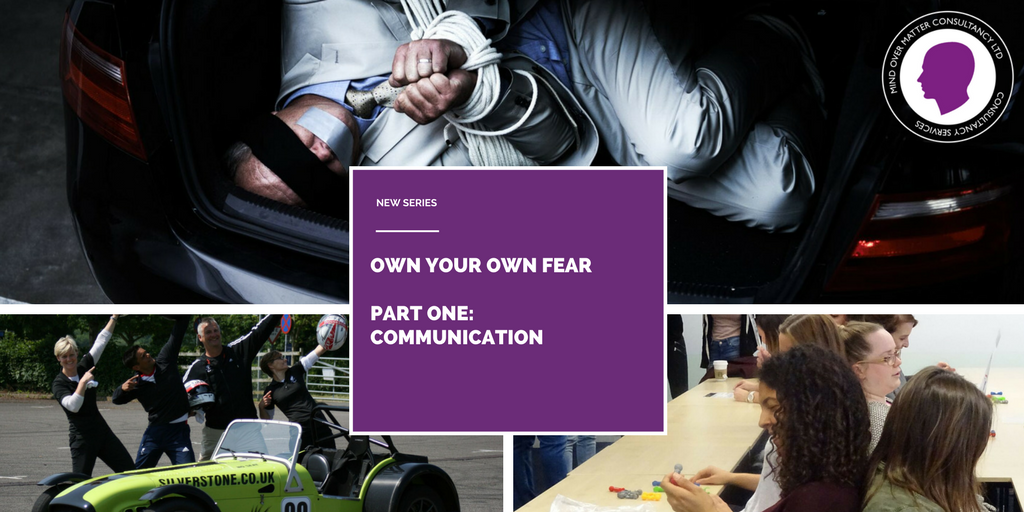
Welcome to our series: Own Your Own Fear
In our first article, we are covering communication and the unusual situations that can arise in this area with experts in the field, our CEO Professor Chris Kemp and hostage negotiation expert, Andy Brown.
One of the issues that we as a company come across quite regularly working in the events world are employees who are exceptional at their jobs but do not have the skills to read or write with confidence.
This came as a complete shock to us the first time that we discovered this during a course that we were running for production staff.
At the end of the programme where those participating had worked with my team on a range of practical skills, we held a written examination session.
A group of participants sat away from the rest in a corner and did not seem to be taking part in the test. I went over and asked them if they needed any help and after a short conversation, the group identified that they struggled with reading and writing and thus would not be able to complete the courses as the assessment was mandatory.
I spoke to the rest of the team and we decided that we would hold an aural examination, where I would ask the same questions as were on the examination paper and one of the other members of the team would write down the answers.
Although this took an inordinate amount of time it was clear that by doing it we were giving experiential learners who had incredible skills in their workplace environment the opportunity to be able to attain a certification which would help them to advance.
This lesson taught us to respect peoples learning styles and since the first time, five years ago, that this happened, we have taken over thirty-five people through our various courses in this manner.
We often put blocks in the way of learning and it is clear that we should not as some of these people have excellent skill sets and their actions in an emergency or incident situation are much quicker as their descriptive powers are finely tuned and over the radio they are dynamite.
We will continue to offer this service as we feel that it is so worthwhile in enabling people to reach their potential.
Here one of our educators, hostage negotiation expert and Chief Inspector (retd.) Andrew B. Brown shares his thoughts through personal experience of this area.
Active Listening Skills
As a seasoned hostage/crisis negotiator, I understand all too well the construct of how we, as human beings, interact in our communication.
Watch a small child learning to speak, they listen attentively to the words you emphasise (keywords), watch your mouth, your body language and then mirror this as they try to form their first words. As they grow, we teach them the unwritten rules of social communication and the importance of manners; please and thank you are powerful words.
The importance of actively listening in communication cannot be underestimated, especially when intervening with a person in crisis.
Active listening comprises of minimal encouragers, open-ended questions, reflecting/mirroring, emotional labeling, paraphrasing, I messages, effective pauses, and summary.
Used in conjunction with the simple and proven behavioural change stairway, active listening is the foundation to empathically listen to someone and build that trust and rapport before you carefully use influence and persuasion techniques to change the person’s behaviour.
Active listening is often described as the stealth weapon of effective negotiation and used skilfully can make a person in crisis feel listened to and can gently talk them back from the precipice of despair as they contemplate taking their own life.
Often referred too as ‘Street Psychologists’ the hostage/crisis negotiator knows when to push, stand firm or yield in a negotiation to achieve a positive outcome.
Our skills are easily transferable to all walks of life and help guide you through both professional and personal challenges.
Andy runs our course for high performers, Taken: Out of your Comfort Zone.
Negotiation and communication are two key elements in all teams and this scenario-based activity focuses on these key aspects during a live kidnap/active shooter scenario.
To find out more about engaging your fear, take a look at our dynamic and bespoke courses ranging from active learning workshops which require participants to engage with ideas and approaches as individuals, groups and as a cohort. These courses are unique as they are credit rated by Edinburgh Napier University.
Intended outcomes
- To equip high performing managers with the appropriate practical capabilities in the fields of management and leadership.
- To encourage and support participants in developing themselves and their teams as practicing managers and leaders.
Or you may wish to try our extreme corporate away days, #BlowYouAwayDays where we offer a range of interactive, highly-pressurised, immersive-learning programmes underpinned by applied leadership and management theory.
Could you negotiate with a kidnapper?
Could you survive a storm?
Could you dance like no one’s watching?
Could you handle a Grand Prix circuit?
Here is what people say about us:
“I loved the amount of participation which we had. The scenarios area offers a brilliant way to gain new knowledge and then test it in a safe, but exciting atmosphere”
“The experience that Chris has in many areas means he is so informed. The interactive elements of the course were excellent and I loved the ‘learning in the round’ teaching approach”
Contact us for more information
